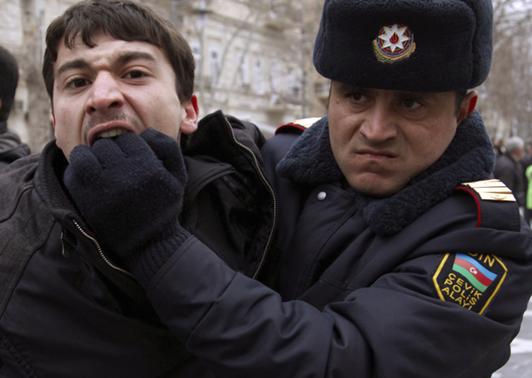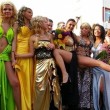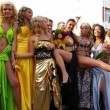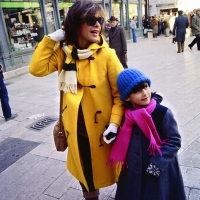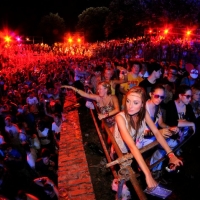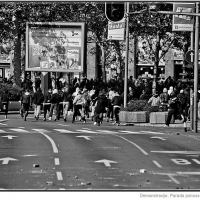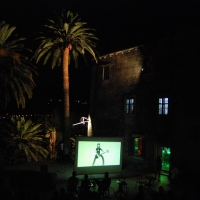This year’s annual event celebrating all that is gauche, glittered and benignly nationalistic, will be the most controversial Eurovision competition of all time. Of course, the countries of the former Yugoslavia will continue to baffle Western critics by voting across ethnic lines for one another
Stirring unprecedented controversy this year is the host country’s atrocious human rights record. During the last decade, Azerbaijani President Ilham Aliyev has returned to the old Soviet way of doing things: bans on the right to free association, and the arrest and torture of journalists and opponents of the regime.
One story in particular has drawn attention to Aliyev’s cruelty: In March of 2011, a Harvard-educated 29-year old opposition leader and online activist named Bakhtiyar Hajiyev was arrested and thrown in prison. While in custody, he was beaten, tortured, and threatened with rape. Despite pleas for his release from numerous human rights organizations, diplomats, and Harvard professors, he remains locked up in an Azerbaijani prison.
Three months after Hajiyev’s arrest and subsequent torture, former Serbian President Boris Tadic erected a bronze statue of the Azerbaijani dictator’s late father in a park in central Belgrade. The unveiling of the new statue of the dictator was pure authoritarian kitsch: a red carpet was rolled out to welcome Aliyev (sporting the requisite dictator’s mustache), as traditional Azerbaijani dancers writhed around a bunch of stiff-looking Serbian officials in black suits. Azerbaijan has reciprocated by placing the Serbian embassy in a very prominent position in Baku, a city that has gotten a $700 million (some even estimate $1,240 billion) facelift to improve its appearance for Eurovision spectators.
As part of that old dictator’s club known as the non-aligned movement, Yugoslavia was the only communist state to participate in Eurovision during the Cold War. It made its debut in 1961, with Ljiljana Petrovic’s elegant (at least for Eurovision) Some Distant Stars. But as Dr. Dean Vuletic wrote in his article, European Sounds, Yugoslav Visions, as early as that first festival, clashes between the decadent, Western contest and Yugoslav communist ideology were evident: In Yugoslavia, Petrovic was instructed to wear an outfit “befitting a socialist woman”, and as such, wore an understated, conservative dress decorated with nothing more than a simple brooch:
The same year that communist Yugoslavia made its big debut at the Eurovision Song Contest, the Eastern Bloc decided it needed a song contest of its own. And thus the ideologically sanitized version of Eurovision- creatively named ‘Intervision’ – was born.
The contest, which was held in Sopot, Poland each year, was the brainchild of one Wladyslaw Szpilman, the Polish-Jewish musician who went on to become the subject of Roman Polanski’s film The Pianist. Intervision adopted a novel voting system: since a large number of viewers in the Eastern Bloc did not own a telephone, they were instructed to turn lights on in their homes if they liked a song and to turn them off if they didn’t. Workers at a local power plant allegedly reported surges in electricity to the contest organizers, who would then calculate the year’s winner. If this doesn’t sound like a very precise method for counting votes, it’s worth remembering Joseph Stalin’s old quip: “It’s not who votes, but who counts the votes that matters”.
Yugoslavia finally won Eurovision in 1989 with the Western-style pop rock song Rock Me by the Croatian band Riva, and thus had the great honor of becoming Eurovision’s host in 1990- right before everything went to hell.
With ethnic tensions on the rise, many participating countries tailored their songs to themes of peace and unity. But not even Eurovision could hold Yugoslavia together, and in 1991, the country – with its 6 republics and 2 autonomous provinces – was represented at Eurovision for the very last time.
Yugoslavia’s last entry came from a blond, Alaïa-clad Serbian singer called Bebi Dol. Though the song scored second to last, Bebi Dol’s Brazil was likeable, immensely popular, and subtly defiant. The opening of the song’s music video shows an outline of the borders of Yugoslavia drawn in a pile of dirt. Two men begin digging a hole through it, before reaching a Kusturica-esque underground tunnel that leads them away from Yugoslavia and straight to distant, dreamy Brazil.
These days, despite the lingering ethnic tensions in the region, the former Yugoslav republics all tend to vote for each other. The Serbian winner of the 2006 contest, Marija Serifovic, received the maximum allotted 12 points from Bosnia, Croatia, Macedonia, Montenegro and Slovenia. Many have commented that Eurovision provides a rare space in which a version of regional ‘Brotherhood and Unity’ is resurrected, at least for the duration of the contest. Meanwhile, this phenomenon has prompted some racist commentators in Western Europe to complain about so-called ‘Bloc voting’, which allegedly allows “undeserving” Eastern European contestants to triumph over more ‘quality’ offerings (whatever that means in Eurovision critics’ circles) from places like the UK, Germany, and France.
Even more remarkably, mainstream audiences in the famously conservative Balkans tend to tolerate and even celebrate the ‘alternative’ representations of gender and sexuality on open display during the song contest (neighboring Iran has complained that Azerbaijan will be hosting a ‘gay pride parade’ during this year’s contest). When Serifovic, a very butch female singer of Roma origin won the contest in 2006, between 70,000 and 100,000 gleeful fans greeted her upon her return to Belgrade. This proves that national pride can trump nearly any other consideration in the region, and begs the question: how far would LGBT rights be advanced in Serbia if Novak Djokovic came out as gay?
Americans in Europe love watching Eurovision because we get to enjoy the complete and total annihilation of the notion of European cultural sophistication and superiority. Europeans love to bash Americans for being stupid and tasteless. Eurovision is perhaps the only time of the year we can ask Europe the Hegelian question: does evil (or at least incredibly bad taste) dwell in the gaze that perceives it? This year’s contest in Baku will no doubt test the boundaries of Europe and its values, and as always, its good taste.


